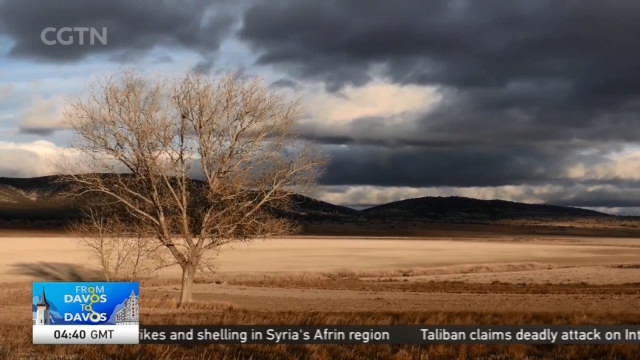
10:32, 23-Jan-2018
Davos World Economic Forum 2018: Economic growth and environmental protection to be central themes

The World Economic Forum is about to get underway in Davos, Switzerland. The event will seek ways to stoke economic growth and save the environment. These two central themes are likely to be handled largely as separate issues, which many environmentalists say might be adding to the difficulty of finding lasting solutions to either. CGTN'S Jack Barton spoke to experts in Europe and Asia before heading to the forum in Davos, to see if 2018 will mark a new approach to two perennial problems.
Spain is a perfect example of how complex and intertwined the issues of economic growth and the environment are. The country is in the grip of its worst drought in decades. It's led to water shortages, a crisis for farmers and devastating forest fires, even in the wettest region of Galicia. A lot of the blame has been directed at climate change, which most scientists warn is to a significant degree driven by human economic activity.
DAVID SAURI, PROFESSOR OF ENVIRONMENTAL SCIENCE UNIVERSITY AUTONOMA OF BARCELONA "Coal and oil energy production is a major contributor to climate change. And then to a lesser extent I would say all the land use, all the land cover transformation in the tropic for instance the burning of forests is a contributor but this is relatively small compared to energy transformation and production."
Higher temperatures in Spain have led to a loss of groundwater. But rainfall is also low, threatening to turn parts of the country into arid deserts through a process called aridification.
NARCIS PRAT, PROFESSOR OF ECOLOGY UNIVERSITY OF BARCELONA "The main thing is the precipitation is below 400 millimeters you get a serious problem of drought and when you get 200 millimeters you are just in the process of aridification so the drought may become irreversible so these two points are very important 400 and 200 there are many areas in Spain which are 200 today. So there is a process of aridification due to the diminishing of rain but also in the areas between 200 and 400 there is also a problem because with the same rain the plants are using more water so you get more aridification now as with the same rain of the past."
Spain's important agriculture sector is compounding the crisis.
NARCIS PRAT, PROFESSOR OF ECOLOGY UNIVERSITY OF BARCELONA "In many of our big rivers agricultural resources use 90 percent of the rivers 90 percent of the resources so in the dry years they use all the resources the rest is for the cities."
Spain, of course, is just a small part of what is a global crisis being driven by an economic model that has pushed our natural environment to breaking point.
KIM BOWON KAIST UNIVERSITY, SOUTH KOREA "These issues are one issues, two sides of a coin. Economy, environment, energy and education, these four Es are the same thing. So I think now days all these problems, economic problems, environmental problems energy issues and education these issues must be tackled simultaneously, you cannot talk about one issues in separation from the others so they have to talk about these issues as one big theme otherwise you cannot find a sustainable solution."
But at the World Economic Forum in Switzerland, the issues of economic growth and halting climate change are often treated as two very different themes. As this year's meeting gets underway many environmentalists wonder will 2018 be any different?
JACK BARTON DAVOS, SWITZERLAND In the next segment we will take a look at the alarming rate that plant and animal life are disappearing on this planet due to our economic activity and start looking at some of the ways we could turn back the tide before it's too late. Jack Barton, CGTN, the World Economic Forum in Davos.

SITEMAP
Copyright © 2018 CGTN. Beijing ICP prepared NO.16065310-3
Copyright © 2018 CGTN. Beijing ICP prepared NO.16065310-3